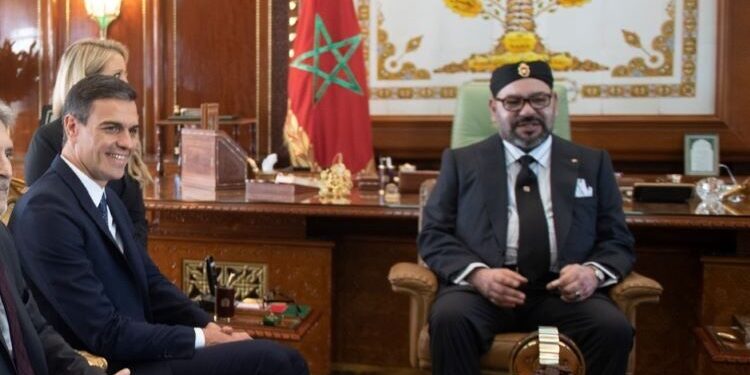Eduardo González
The President of the Government, Pedro Sánchez, yesterday initiated “a new stage” in relations with Morocco with the recognition of the autonomy plan for Western Sahara as “the most realistic basis” to solve the conflict. This decision, which could open a new breach in the coalition government, was widely praised by Rabat and denounced by the Polisario Front. The Minister of Foreign Affairs, Jose Manuel Albares, announced that he will travel to Morocco “before April 2” to prepare a visit of Sanchez and that he has asked for an “urgent” appearance before the Congress, while assuring that the change of course will not affect the relations with Algeria.
The news broke yesterday after the Moroccan Royal House published a letter sent by Pedro Sanchez to King Mohammed VI in which he recognized “the importance of the Sahara issue for Morocco”, highlighted “Morocco’s serious and credible efforts within the framework of the United Nations to find a mutually acceptable solution” and assured that the autonomy plan proposed by Rabat in 2007 constitutes “the most serious, credible and realistic basis for the resolution of this dispute”.
“Spain will act with the absolute transparency befitting a great friend and ally,” continued the letter, which reiterated the “determination” of the Spanish government “to face together the common challenges, especially cooperation in the management of migratory flows in the Mediterranean and the Atlantic, in a spirit of full cooperation.”
Following the publication of this letter, the Moroccan Ministry of Foreign Affairs issued a statement in which it praised “Spain’s positive positions and constructive commitments on the Moroccan Sahara issue” and stated that the terms of Sanchez’s letter to the King “allow glimpses of a clear and ambitious roadmap to inscribe, in the long term, the bilateral partnership within the framework of the new foundations.”
Subsequently, the Spanish government itself issued a statement announcing the beginning of “a new stage in the relationship with Morocco based on mutual respect, compliance with agreements, the absence of unilateral actions and transparency and permanent communication.” “This new stage will be developed, as indicated in the communiqués of the Moroccan government, on a clear and ambitious roadmap, all to guarantee the stability, sovereignty, territorial integrity and prosperity of our two countries,” it continued.
Albares: “Algeria is a reliable partner”
For his part, José Manuel Albares gave a press conference from Barcelona in which he confirmed that “Spain considers that the 2007 autonomy initiative is the most serious, realistic and credible basis for the resolution of this dispute”. He also announced that he himself will go to Rabat “before April 2” to prepare a subsequent trip of Pedro. Sánchez in which “the road map of the new stage” will be developed and informed that he had requested his appearance, “at his own request and urgently”, before the Foreign Affairs Committee of the Congress of Deputies to explain this issue.
Albares also assured that he was not worried about the possible negative effects of this decision on the relations between Spain and Algeria (an important rival of Morocco precisely because of its position in favor of the independence of Western Sahara), relations that are especially important for the supply of gas in the current context of war between Russia and Ukraine. “Algeria is a reliable partner, a strategic partner and a friend of Spain and has repeatedly demonstrated it”, assured Albares, who did not specify whether Algiers had been informed of this change of course: “Diplomacy requires discretion, but I maintain very fluid communication with my counterpart, Ramtane Lamamra”.
Apart from that, the minister played down the importance of the differences that only yesterday began to emerge within the coalition government because of Sánchez’s decision. “Nuances between members of the same government are normal in democracy, in a coalition government and even in a monocolor government,” he said. “There is total unity within the Government in defending the interests of Spaniards in times as convulsive as these,” he assured.
In fact, the change of course on the part of Sánchez has already generated a new breach in the coalition government. The second vice-president, Yolanda Díaz, declared yesterday that the resolution of the conflict over Western Sahara must “go through dialogue and respect for the democratic will of the Saharawi people”, the leader of Podemos and Minister of Social Rights, Ione Belarra, demanded a “just, lasting and acceptable political solution for all parties” that “provides for the self-determination of the Saharawi people”, and the federal coordinator of IU and Minister of Consumer Affairs, Alberto Garzón, declared that the Saharawi people “have the right to express how they want their future to be through a free referendum, as established since 1995 by the Security Council of the United Nations”.
For its part, the PP described as “intolerable that this change of a political position of traditional consensus, undoubtedly a policy of State, 47 years old, is made without informing the main opposition party, which shows the way in which Pedro Sanchez understands ‘the policy of State'”.
The Saharawi question in the diplomatic crisis of 2021
Recognition of the autonomy plan and, implicitly, of possible Moroccan sovereignty over the former Spanish colony had become Rabat’s main red line for the redirection of diplomatic relations with Spain. Until now, the current Spanish government had limited itself to defending the search for a “mutually acceptable political solution for the parties and within the framework of the UN” and to supporting, in this sense, the work of the new UN envoy for the Sahara, Staffan de Mistura.
Therefore, the new gesture of Pedro Sanchez should be a turning point in the bilateral relations, very deteriorated for almost a year because of the reception in Spain, for humanitarian reasons, of the leader of the Polisario Front, Brahim Ghali, which was answered by Morocco with a massive invasion of migrants in Ceuta forced by the Moroccan authorities and with the call for consultations, in May, of its ambassador in Madrid, Karima Benyaich, who has not yet returned to Spain. In the meantime, Spain and Morocco are still awaiting a High Level Meeting (HLM) initially scheduled for mid-December 2020 and which has been postponed due to the COVID-19 pandemic and the absence of the ambassador.
The tug-of-war between Morocco and Spain over the Saharawi issue became particularly tense following the decision of former U.S. President Donald Trump to recognize Moroccan sovereignty over Western Sahara. To complicate matters further, the Moroccan government reported on January 5 that German President Frank-Walter Steinmeier had sent a letter to Mohammed VI in which he defended the autonomy plan because he considered it a “good basis” for resolving the conflict. Following this change of course on the part of Berlin (whose relations with Rabat had also deteriorated sharply because of the Saharawi question), the Moroccan Minister of Foreign Affairs, Naser Burita, and his German counterpart, Annalena Baerbock, agreed on 16 February last to begin a “new dialogue to overcome their misunderstandings and to deepen their bilateral relations”.
Polisario Front
Who has not exactly been satisfied with the new Spanish position is the Polisario Front, whose delegate in Spain, Abdulah Arabi, denounced yesterday, in declarations to Europa Press, that the Government of Sanchez had succumbed “to the pressure and blackmail” of Morocco as a “toll” to reconduct diplomatic relations. According to Arabi, Spain has spent years “constantly trying to please Morocco” and playing with an “ambiguity” that does not correspond to it as an “administering power” of a territory pending decolonization.
“Spain has a political and legal responsibility” and the defense of autonomy “contradicts enormously with its responsibility”, warned Arabi, for whom the new position of the Spanish government shows its “hypocrisy” when it speaks of “defending international legality”. According to the Saharawi representative, the autonomy plan “is an option, but it is not the solution” and it is therefore necessary that a referendum of self-determination be called because “the solution must be based on the choice of the Saharawi people”.







